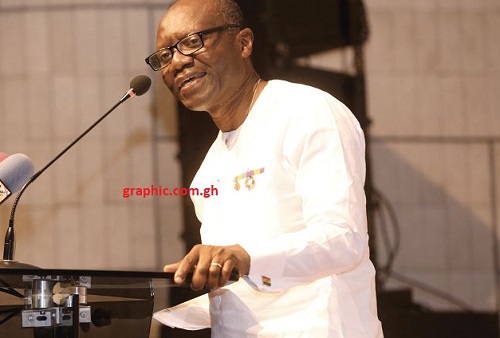
Tax Eurobond — CITG to government
The Chartered Institute of Taxation, Ghana (CITG) has recommended the taxing of Eurobond to enable the country to pay part of its debt.
The President of CITG, George Ohene Kwatia, who intimated the recommendation of the institute, said it was unfortunate that the country was challenged with debt issues when there were means it could deal with its revenue shortfalls.
At the 2023 orientation, graduation and induction ceremony of CITG, Mr Kwatia said: “On the local fronts, coupon payments and interests on bonds are taxed.
Incidentally, Eurobonds are not taxed. Eurobond has been the biggest challenge to us in our debt management. We sit here and do not tax Eurobonds and investors take the money free.”
The country, he said, needed certain provisions that would allow investors to pay the appropriate tax.
“We are recommending that provision should be made to task Eurobond. At least we will use that to pay part of our Eurobond,” he said.
To also deal with the challenge of the country’s revenue mobilisation, the companies code should be amended to ensure that companies mandatorily appointed tax practitioners as seen with auditors “and that will close the gap of what is disclosed and what is collected”.
Taxation, he said, was a crucial artery that sustained the nation’s economy as it formed the financial lifeline that powered governmental functions, facilitating the provision of vital public services, and stimulating economic progress, among others.
Sealing Loopholes
For this reason, the government, he said, must ensure that certain laws and provisions were put in place to seal revenue mobilisation loopholes and deal with the revenue shortfalls of the country.
The ceremony witnessed the graduation of 400 candidates who had successfully completed their professional qualifying examinations and were eligible to undergo the mandatory post qualification working experience.
Additionally, 150 newly qualified chartered tax practitioners were inducted into the membership of the institute. The theme was “Navigating the tax and fiscal space in the midst of Sovereign Debt and Financing Crisis: The role of Chartered Tax Practitioners”.
Mr Kwatia tasked the tax practitioners to bring their expertise on board to enable the country to collect the right taxes to fund its development.
A senior partner at KPMG, Anthony Kwasi Sarpong, said the country had the lowest tax revenue to Gross Domestic Product (GDP) ratio in the sub-region which called for more efforts to ensure people paid their taxes and did so rightly. Many businesses were said to be taking advantage of the loopholes in the tax administration system, therefore, denying the country the needed revenue for its development.
He said the tax practitioners had a responsibility to advise on tax policies that would strike a balance between revenue mobilisation and private sector growth.
“We are told that 70 per cent of our businesses are in the Small and medium-sized enterprises (SMEs) scale and informal sector, we lack the efficiencies to fully assess and properly tax this sub-sector. Most state-owned enterprises are reporting losses and do not contribute positive returns on the investment made on them. We have big special tax exemptions for some multinationals in specific areas,” he added.
Global tax system
Being part of a global network, the tax practitioners, he said, had the power to shape and contribute to international tax dialogues, canvassing for a fairer, more efficient and transparent global tax system.
For the government, he said they should support the transformation of the Ghana Revenue Authority (GRA) with investment in technology to effectively handle especially revenue collections at the ports and borders.
“If the break of VAT is spread and more businesses comply, revenue will go up and we can eventually reduce the rate from 22 per cent to below 15 per cent,” he indicated.
In a speech read on his behalf, the Minister of Education, Dr Yaw Osei Adutwum, said the government was working on initiatives designed to reinforce the practical aspects of tax education within academic institutions.
“In these challenging times of sovereign debt and financial crises, the role of Chartered Tax Practitioners is pivotal,” he said, adding: “You are entrusted with the task of guiding Ghana’s fiscal course through these stormy economic waters”.
Commending the CITG for continuous professional development of tax professionals, Dr Adutwum said aside from quality training, there was the need for effective regulation of the practice of taxation to maintain the integrity and credibility of the profession.